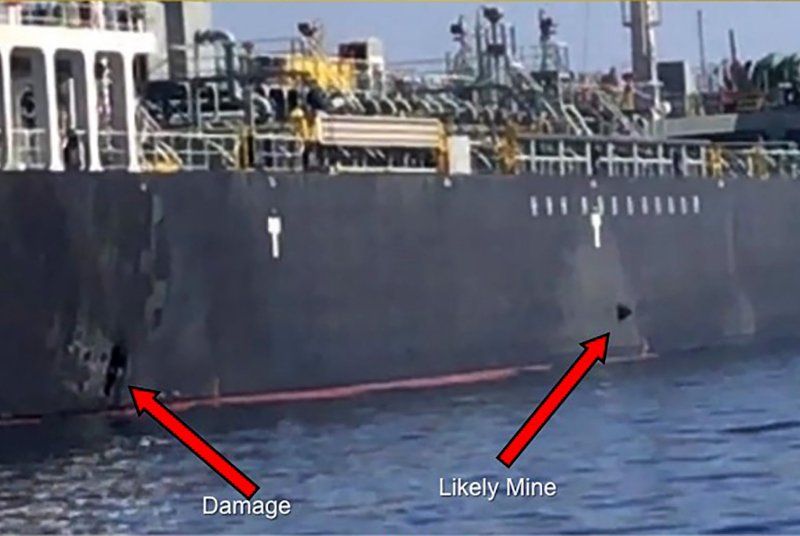A Powerpoint slide provided by U.S. Central Command shows damage from an explosion, left, and a likely limpet mine on the hull of the civilian vessel M/V Kokuka Courageous in the Gulf of Oman on Thursday. Photo courtesy of U.S. Navy |
License Photo
June 17 (UPI) -- As Japanese Prime Minister Shinzo Abe was landing in Tehran, news broke of a Houthi missile attack on a civilian airport in the Saudi city of Abha. Twenty-six people were wounded. Observers judged the mission as dead on arrival. The following day, as Abe was meeting with Iranian President Hassan Rouhani and supreme leaderAli Khamenei, two tankers were attacked in the Gulf of Oman, one of which is Japanese.
The attack put the United States and Iran closer to a collision course. They started exchanging accusations. While the United States and its allies accused Iran, the latter replied that the attack is a stunt by the United States to disrupt diplomacy.
Going back to the current standoff, it is important to examine its immediate cause. The New York Times reported on May 15 that the United States has detected revolutionary guards loading missiles into small dhows. The news came out after four tankers were sabotaged, off the coast of Fujairah, in the Gulf of Oman. As a response, the United States mobilized its military in the Arabian Gulf.
Commenting on the buildup, Jeremy Hunt, the United Kingdom foreign secretary, said the escalation can lead to a clash, even if unintended. If we go back to the first World War, we see that the war that devastated Europe and left 20 million dead was caused by a single act: the assassination of an aristocrat by a student. Therefore, unless immediate measures to de-escalate are taken, a confrontation can occur, even if unwanted.
Following the attack, U.S. President Donald Trump tweeted that Abe's goodwill effort is premature and that neither the United States nor the Iranians are ready for talks. Though many analysts see Abe as humiliated by Trump and rebuffed by Khamenei, diplomacy should not stop. Abe should work toward the creation of a buffer zone between the United States and Arab Gulf states on one hand and Iran on the other hand. A breathing space will allow the different parties to enter into meaningful negotiations in a relatively calm and rational mood.
The area in which the attacks have occurred is a very volatile one. It's near the strait of Hormuz, an important chokepoint through which a fifth of the world's energy is transported. Facing sanctions, Iran has threatened to close it. In this very hot spot, Bandar Abbas is located, the main base for the Iranian navy. Nearby is the state of Bahrain. The fifth fleet, the main American naval fleet in the Middle East, is based on the island.
On the other side of the Arab peninsula is another strategic passage: Bab el Mandeb. Every day, 4.8 billion barrels of crude oil and petroleum products pass through this chokepoint. Bab el Mandeb is situated off the coast of Yemen, which is under the influence of Iranian-linked Al Houthis. On the other shore of el Mandeb lies a very unstable Ethiopia.
The first step is to de-escalate and reduce the tensions by putting rules that will create a buffer between the different parties and reduce chances for confrontation. Hence, the need for rules of engagement. Abe should, under the auspices of the United Nations, call for a non-partisan group of naval experts to put together rules of engagement, while taking into consideration the geostrategic nature of the waters surrounding the Arab peninsula all the way to the Suez Canal. If those rules are put in place, the different parties will be inclined to abide by them, as the transgressor will be held accountable. In addition, an impartial surveillance and monitoring system should be devised to make sure they are being respected by the different parties.
In addition to calming the different parties, the rules of engagement will protect the free flow of goods and people. They will ensure the security of the maritime route transporting energy to the world. The security of the navigation contributes to the stability of energy prices, a very important element to the world economy. Any disruption in the supply of oil can be catastrophic to world markets.
De-escalation is welcomed by the different parties. During a security summit on June 8, in Bratislava, Anwar Gargash, the United Arab Emirates minister of state for foreign affairs, said, "Wisdom, patience and de-escalation are required to avoid a lurch toward war." Though rules of engagement will calm the current tensions, they provide no long-term remedy. However, they constitute a good starting point to launch negotiations.
Dania Koleilat Khatib is an affiliated scholar at the Issam Fares Institute for Public Policy and International Affairs at the American University of Beirut. She specializes in U.S.-Arab relations and researches sectarianism, extremism and governance. Her book "The Arab Lobby and the U.S.: Factors for Success and Failure" was published by Routledge UK and translated to Arabic.















